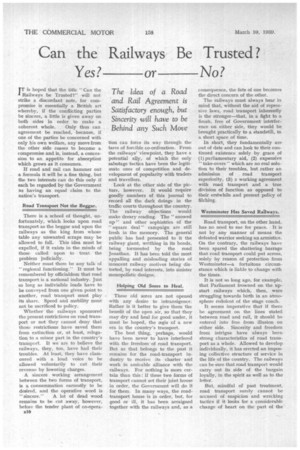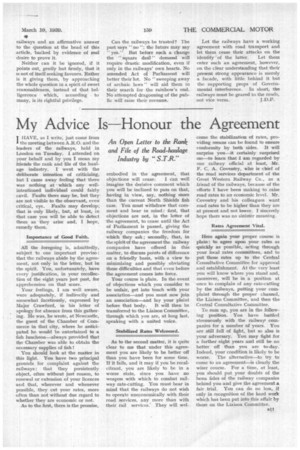Can the Railways Be Trusted?
Page 44

Page 45

If you've noticed an error in this article please click here to report it so we can fix it.
Yes? or --No?
The Idea of a Road and Rail Agreement is Satisfactory enough, but Sincerity will have to be Behind any Such Move TT is hoped that the title " Can the I Railways be Trusted?" will not strike a discordant note, for compromise is essentially a British art whereby, if the conflicting parties be sincere, a little is given away on both sides in order to make a
coherent whole. Only thus can agreement be reached, because, if one of the parties be concerned with only his own welfare, any move from the other side ceases to become a compromise and is, instead, a concession to an appetite for absorption` which grows as it consumes.
If road and rail can hammer out a formula it will be a fine thing, but the two interests can do this only if each be regarded by the Government as having an equal claim to the nation's transport.
Road Transport Not the Beggar.
There is a school of thought, unfortunately, which looks upon road transport as the beggar and upon the railways as the king from whose table any unwanted scraps may be allowed to fall. This idea must be expelled, if it exists in the minds of those called upon to treat the problem judicially.
Neither must there be any talk of "regional functioning." It must be remembered by officialdom that road transport is a national industry. Just so long as indivisible loads have to be conveyed from one given point to another, road transport must play its share. Speed and mobility must not be sacrificed to policy.
Whether the railways sponsored the present restrictions on road transport or not they cannot deny that those restrictions have saved them from extinction or, at least, relegation -to a minor part in the country's transport. If we are to believe the railways, they, too, have had their troubles. At least, they have clamoured with a loud voice to be allowed voluntarily to cut their revenue by lowering charges.
A sincere working arrangement between the two forms of transport, is a consummation earnestly to be desired, and the operative word is "sincere." A lot of dead wood remains to be cut away, however, before the tender plant of co-operaEl° tion can force its way through the tares of forcible co-ordination. From the railways' viewpoint, they have a potential ally, of which the, only sabotage tactics have been the legitimate ones of competition and development of popularity with traders and travellers.
Look at the other side of the picture, however. It would require goodly numbers of this journal to record all the dark doings in the traffic courts throughout the country. The railway objections would make dreary reading. The "snowed up " and other sophistries of the " square . deal" campaign are still fresh in the memory. The general public has had presented to it the railway giant, writhing in its bonds, being tormented by the road Jonathan. It has been told the most appalling and misleading stories of innocent railway motives being distorted, by road interests, into sinister monopolistic designs.
Helping Old Sores to Heal.
These old sores are not opened with any desire to intransigence. Rather is it better to give them the benefit of the open air, so that they may dry and heal for good under, it must be hoped, the zegis of a new era in the country's transport.
The best thing, perhaps, would have been never to have interfered with the freedom of road transport. But as that belongs to the past it remains for the road-transport industry to receive its charter and work in amicable alliance with the railways. For nothing is more certain than this : if these two forms of transport cannot set their joint house irt order, the Government will do it for them. In many ways, the roadtransport house is in order, but, for good or ill, it has been arraigned together with the railways and, as a consequence, the fate of one becomes the direct concern of the other.
The railways must always bear in mind that, without the aid of repressive laws, road transport inherently is the stronger—that, in a fight to a finish, free of Government interference on either side, they would be brought practically to a standstill, in a short space of time.
In short, they fundamentally are out of date and can look to their continued existence solely by grace of (1) parliamentary aid,. (2) expensive " take-overs " which are no real solution to their troubles, but rather an admission of road transport superiority, (3) a working agreement with road transport and a true division of function as opposed to their erstwhile and present policy of filching.
Westminster Has Saved Railways.
Road transport, on the other hand, has no need to sue for peace. It is not by any manner of• means the defeated warrior seeking an armistice. On the contrary, the railways have been spared the shattering barrage that road transport could put across, solely by reason of protection from Westminster—a fortuitous circumstance which is liable to change with the times.
It is not so long ago, for example, that Parliament frowned on the upstart railways which, then, were struggling towards birth in an atmosphere redolent of. the stage coach.
It seems imperative that if there be agreement on the lines stated between road and rail, it should be entered into free from illusion on either side. Sincerity and freedom from intrigue have always been strong characteristics of road transport as a whole. Allowed to develop individually, it has erected an imposing collective structure of service in the life of the country.. The railways can be sure that road transport would carry out its side of the bargain loyally, in the spirit as well as to the letter.
But, mindful of past treatment, road transport surely cannot be accused of suspicion and wrecking tactics if it looks for a considerable change of heart on the part of the railways and an affirmative answer to the question at the head of this article, backed by evidence of real desire to prove it.
Neither can it be ignored, if it points out, gently but firmly, that it is not of itself seeking favours. Rather is it giving them, by approaching the whole question in a spirit of sweet reasonableness, instead of that belligerence which, according • to many, is its rightful privilege.
Can the railways be trusted? The past says " no "; the future may say " yes." But before such a change the "square deal" demand will require drastic modification, even if only in the railways' own hearts. No amended Act of Parliament will better their lot. No "sweeping away of archaic laws" will aid them in their search for .the rainbow's end. No attempted dragooning of the public will raise their revenue.
Let the railways have a working agreement with road transport and let them cease their attacks on the identity 'of the latter. Let them enter such an agreement, however, on the clear understanding that their present strong appearance is merely a facade, with little behind it but the supporting props of Governmental interference. In short, the railways must be geared to the roads, not vice versa. J.D.P.




























































































